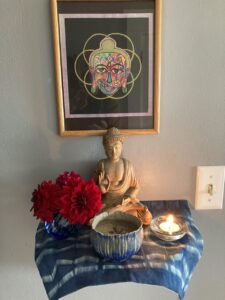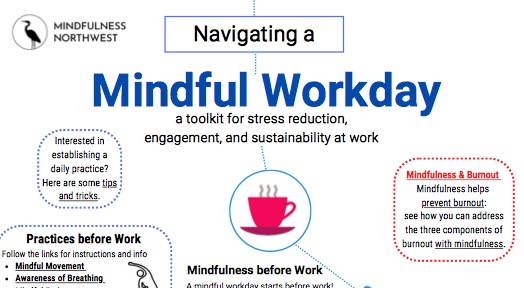Dear Friends,
Lately I’ve been thinking about how I can support myself better in living more deeply in the way I intend: to be more grounded and deliberate in my choices at home, especially. And since I’m home so much more, this matters. Work, play, rest, all is happening almost totally at home now. How can I meet my days more fully?
Are you also finding it hard not to drift at home? Using technology, which most of us are also using a lot, ‘more’ seems to be particularly slippery in terms of making choices about how I want to use my time. It’s so easy to unintentionally misuse my time. For example, I may be heading for a bit of research online or for a moment of writing and end up spending 45 minutes on email or reading the news for the fifth time that day. And once I notice what’s going on, it usually doesn’t feel good.
I also notice when I’m unfocussed and drifty like this that I’m also more vulnerable to low moods. It’s easier to dip into depression or spin into anxiety.
It’s surprising how easily we can drift and flit about so, isn’t it? Mindfulness is all about being intentional and grounded, and I do mindfulness practices every day, and have for 30 years!
So what’s going on? Are some distractions just too sticky? Are tough moods just inevitable? Or are there other practices and supports I can add to my home life to help me with this?
A good friend of mine, a fellow teacher of MBSR, identifies herself as a contemplative. On her Facebook page, email signature, and I assume when she’s thinking about who she is, there’s a short list of roles and one of them is that she is a “contemplative.”
This got me thinking. Am I a contemplative? I do a lot of contemplative practices, that’s for sure. I’m also ordained into a religion that prizes sitting meditation. I’ve spend time in monasteries – the traditional home for contemplatives, too. So yes I guess I pass the “duck test” pretty well there.
And then I thought, well, do I actually live like a contemplative? And I answered well: sometimes. Kinda sorta.
What is a contemplative? Literally it’d be “one who contemplates” right? The Oxford English Dictionary’s first meaning is “expressing or involving prolonged thought” – a thoughtful person. Their second meaning is “involving or given to deep silent prayer or religious meditation.” So a contemplative is one who practices, and there’s a connection to religious practice.
And then we’re in tricky cultural waters. The practices of mindfulness are deliberately presented as non-religious. This in the interest of them being accessible to more people and available in settings like workplaces and universities that are supposed to be unconnected to religion. I think this has been skillful and wise.
But there’s a big “and yet” to it, too.
If the very idea of living as a contemplative has religious roots, does that mean we just can’t access a whole set of tools and practices outside of a religious context? That’s all off limits unless you’re “doing religion”? That seems like a great shame. Maybe there are ways to fold these practices into a modern life.
So I thought about the Zen Buddhist training as that’s been a big part of my life. And I encourage you to think about your trainings and connections and upbringing. What’s in there you can tap? You can renew? You can reinvent? What has feeling in your heart and in your body?
For me the container of Zen practice is very grounding. Mindful. Stable. For those hours or that week at the Zen temple I really am living as a contemplative. A contemplative within a kind of sacred space. A place where things feel orderly, calm, deliberate – and I do, too.
I thought about why that might be. Part of it is being with others who are practicing, for sure. But there is also a whole way of being, of moving and holding my body, of acting, that I do within that context that’s important. That matters to me.
I realize that I can practice this whole way of being at home, too. Although it surprises me that I haven’t lived as a contemplative that much at home, it’s never too late to try a new approach.
So I’ve been adding more of the practices I do at Zen centers and monasteries to my home life. Two stand out: making offerings at altars and reciting short mindfulness phrases called gatha (pronounced gah-tuh).
I’m not sure the details of my religion-inspired contemplative home practice matters too much. The point is for each of us to consider what is meaningful and supportive. I encourage you to consider if there is something deep within you to draw on. To bring forth. We are likely to be living under Covid for quite a while longer and as the seasons turn toward Winter such consideration might actually be pretty urgent and important.
But to clarify the example I’ll share a bit about my renewed home contemplative practices.
I’ve set up an altar with a little Buddha statue in my front hall where I see it as soon as I come in the front door and often as I move around my place. And now I do little rituals there several times a day. I light the candle, offer a little bit of incense, bow – all actions I’ve done a million times at Zen places so there’s a real feeling in them for me. And then I recite a little verse depending on what’s next.
It’s a way to pause. A way to set intentions. A way to remember how I want to live. A way to renew again and again the life of a contemplative. And a way to touch into beauty. I’ve been surprised by how moved I am to see my little candle burning by a few flowers from the yard and my little wooden statue of Buddha.
A few examples:
After getting up in the morning I pass this little altar on the way to the kitchen to make coffee. It’s been nice to pause there, light the altar in the newly dark, pre-dawn morning and say:
Awakening in the morning
I arise with gift-bestowing hands
Ready to give my heart to myself,
and to anyone I can be helpful to.
So many of us work at home now. Here’s a verse I’m trying on for after breakfast when I’m ready to sit down to work:
Sitting down to work
I vow with all beings
To apply energy, intelligence, and kindness to my tasks, co-workers, and students
May all of us benefit from today’s work.
Going out to run errands is a big shift in focus to bring some deliberate energy to, I realized. Here’s my draft of a verse to say before leaving for the store:
Re-entering the marketplace
I vow with all beings
To buy and sell with love
Holding bodhicitta as my only true possession
(“bodhicitta” is a Buddhist term for the thought or intention of awakening)
I haven’t decided whether to do another verse when I get home from errands. I know from past experience that if I get too ambitious with this it’ll soon come tumbling down like a house of cards and I won’t do it anymore. What’s the balance? A little is a lot.
Sitting down to eat is a situation many of us say a blessing, or offer a verse, for. This fits into the idea of mindful eating very well. I have two choices. One is from a traditional Zen chant, the other a modern piece by my Buddhist teacher.
Traditional:
Innumerable labors brought us this food
We should know how it comes to us
Receiving this offering we should consider
Whether our virtue and practice deserve it
Desiring the natural order of mind
We should be free of greed, hate, and delusion
We eat to support life and practice the way of Buddha.
Norman Fischer:
As we make ready to eat this food
we remember with gratitude
the many people, tools, animals and plants,
air and water, sky and earth,
turned in the wheel of living and dying,
whose joyful exertion
provide our sustenance this day.
May we with the blessing of this food
join our hearts
to the one heart of the world
in awareness and love,
and may we together with everyone
realize the path of awakening,
and never stop making effort
for the benefit of others.
Finally, I do one last offering at my altar right before heading to the bedroom with a stop at my meditation cushion. I sit without a timer or plan in the evening. Ten or 15 minutes. I offer loving-kindness to myself and a few others who come to mind. I breathe. I just be. And then after this evening sit, as my last out loud words of the day, I recite this poem from the 16th century Japanese haiku poet Kobayashi Issa:
This dewdrop world
is a dewdrop world.
And yet.
And yet.
These are just examples from my experiments so far. I’m curious to see if I sustain these practices. So far it all feels very supportive. Slows me down a little and supports a more deliberate approach to my days. And that helps me a lot with a more stable and joyful mood.
If my examples stir something in you I hope you’ll consider what in your background you can draw on. What can you do every day to help you stay grounded and in touch with your intentions? Perhaps some elements from a childhood religion? Perhaps something from trainings or wilderness trips or spiritual experiences you’ve had? Are there poems you appreciate? Perhaps reciting a poem out loud at a few of these inflection points during the day would be helpful. Or setting up a nice corner in your room for meditation or other practices will make it easier to remember your practice intentions?
What might help you to live more fully as the contemplative I believe we all have the very deep potential to make real in our lives?
Yours,
Tim




